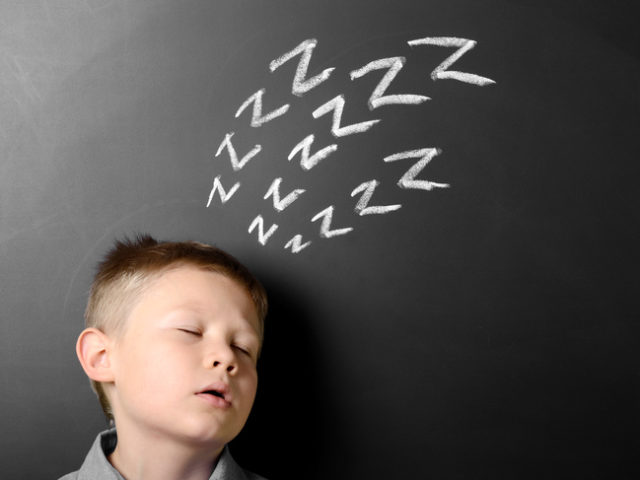Adults are not the only ones who snore. Researchers have found that 20 percent of normal children snore from time to time. Believe it or not, 7 to 10 percent of children snore every night. Snoring is a noise that occurs during sleep when the child is breathing in and there is some blockage of air passing through the back of the mouth. The opening and closing of the air passage causes a vibration of the tissues in the throat. The loudness is affected by how much air is passing through and how fast the throat tissue is vibrating.
Just because snoring is common doesn’t mean that you never have to worry about it. Snoring can be a symptom of sleep apnea, a more serious underlying problem that can affect your child’s physical and mental well-being. Sleep apnea refers to a narrowing of the throat during sleep and is associated with difficulties moving air in and out of the lungs. This in turn leads to disrupted and poor sleep, and in more severe cases can lead to drops in the blood-oxygen level.
Children who are three years or older tend to snore during the deeper stages of sleep. Primary snoring is defined as snoring that is not associated with more serious problems such as obstructive sleep apnea syndrome (OSAS), frequent arousals from sleep, or inability of the lungs to breathe in sufficient oxygen.
You should visit a sleep specialist who works with children. They will be able to detect if your child has sleep apnea or any other sleep disorders. Your child will need to do a sleep study for at least one night at a sleep center. This study is called a polysomnogram (PSG).
Sensors are put on your child’s head, face, chest and legs. The sensors are gently placed on the skin and do not cause any pain. They send tiny electrical signals to a computer. The cables are long enough for your child to move around and turn over in bed. There is no risk or danger related to the sleep study.
The PSG charts your child’s brain waves, heartbeat, and breathing during sleep. It also records eye and leg movements as well as muscle tension. This is the only sure way to find out if your child has sleep apnea. It will also show how severe the problem is. This will help determine the level of treatment that will be needed to help your child.
If your child snores and you think it may be a problem. As a parent, when you are concerned about something, it’s always better to air on the side of caution. Contact Gingras Sleep Medicine at (704) 944-0562 to request an appointment, or request an appointment online.

